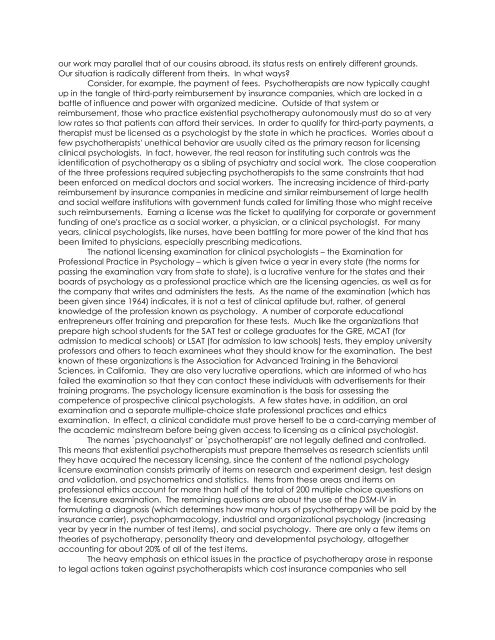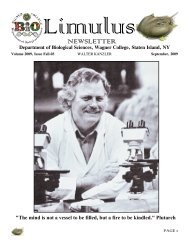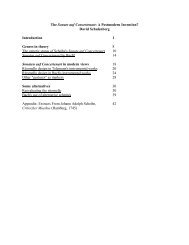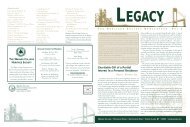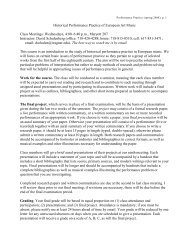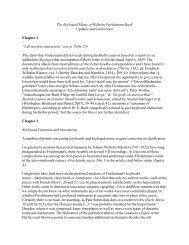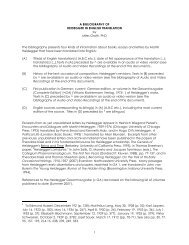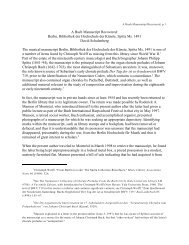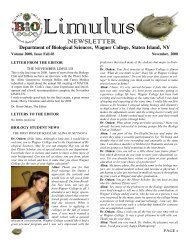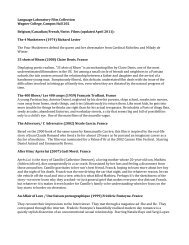SEVEN PAPERS ON EXISTENTIAL ANALYSIS ... - Wagner College
SEVEN PAPERS ON EXISTENTIAL ANALYSIS ... - Wagner College
SEVEN PAPERS ON EXISTENTIAL ANALYSIS ... - Wagner College
Create successful ePaper yourself
Turn your PDF publications into a flip-book with our unique Google optimized e-Paper software.
our work may parallel that of our cousins abroad, its status rests on entirely different grounds.<br />
Our situation is radically different from theirs. In what ways?<br />
Consider, for example, the payment of fees. Psychotherapists are now typically caught<br />
up in the tangle of third-party reimbursement by insurance companies, which are locked in a<br />
battle of influence and power with organized medicine. Outside of that system or<br />
reimbursement, those who practice existential psychotherapy autonomously must do so at very<br />
low rates so that patients can afford their services. In order to qualify for third-party payments, a<br />
therapist must be licensed as a psychologist by the state in which he practices. Worries about a<br />
few psychotherapists' unethical behavior are usually cited as the primary reason for licensing<br />
clinical psychologists. In fact, however, the real reason for instituting such controls was the<br />
identification of psychotherapy as a sibling of psychiatry and social work. The close cooperation<br />
of the three professions required subjecting psychotherapists to the same constraints that had<br />
been enforced on medical doctors and social workers. The increasing incidence of third-party<br />
reimbursement by insurance companies in medicine and similar reimbursement of large health<br />
and social welfare institutions with government funds called for limiting those who might receive<br />
such reimbursements. Earning a license was the ticket to qualifying for corporate or government<br />
funding of one's practice as a social worker, a physician, or a clinical psychologist. For many<br />
years, clinical psychologists, like nurses, have been battling for more power of the kind that has<br />
been limited to physicians, especially prescribing medications.<br />
The national licensing examination for clinical psychologists – the Examination for<br />
Professional Practice in Psychology – which is given twice a year in every state (the norms for<br />
passing the examination vary from state to state), is a lucrative venture for the states and their<br />
boards of psychology as a professional practice which are the licensing agencies, as well as for<br />
the company that writes and administers the tests. As the name of the examination (which has<br />
been given since 1964) indicates, it is not a test of clinical aptitude but, rather, of general<br />
knowledge of the profession known as psychology. A number of corporate educational<br />
entrepreneurs offer training and preparation for these tests. Much like the organizations that<br />
prepare high school students for the SAT test or college graduates for the GRE, MCAT (for<br />
admission to medical schools) or LSAT (for admission to law schools) tests, they employ university<br />
professors and others to teach examinees what they should know for the examination. The best<br />
known of these organizations is the Association for Advanced Training in the Behavioral<br />
Sciences, in California. They are also very lucrative operations, which are informed of who has<br />
failed the examination so that they can contact these individuals with advertisements for their<br />
training programs. The psychology licensure examination is the basis for assessing the<br />
competence of prospective clinical psychologists. A few states have, in addition, an oral<br />
examination and a separate multiple-choice state professional practices and ethics<br />
examination. In effect, a clinical candidate must prove herself to be a card-carrying member of<br />
the academic mainstream before being given access to licensing as a clinical psychologist.<br />
The names `psychoanalyst' or `psychotherapist' are not legally defined and controlled.<br />
This means that existential psychotherapists must prepare themselves as research scientists until<br />
they have acquired the necessary licensing, since the content of the national psychology<br />
licensure examination consists primarily of items on research and experiment design, test design<br />
and validation, and psychometrics and statistics. Items from these areas and items on<br />
professional ethics account for more than half of the total of 200 multiple choice questions on<br />
the licensure examination. The remaining questions are about the use of the DSM-IV in<br />
formulating a diagnosis (which determines how many hours of psychotherapy will be paid by the<br />
insurance carrier), psychopharmacology, industrial and organizational psychology (increasing<br />
year by year in the number of test items), and social psychology. There are only a few items on<br />
theories of psychotherapy, personality theory and developmental psychology, altogether<br />
accounting for about 20% of all of the test items.<br />
The heavy emphasis on ethical issues in the practice of psychotherapy arose in response<br />
to legal actions taken against psychotherapists which cost insurance companies who sell


